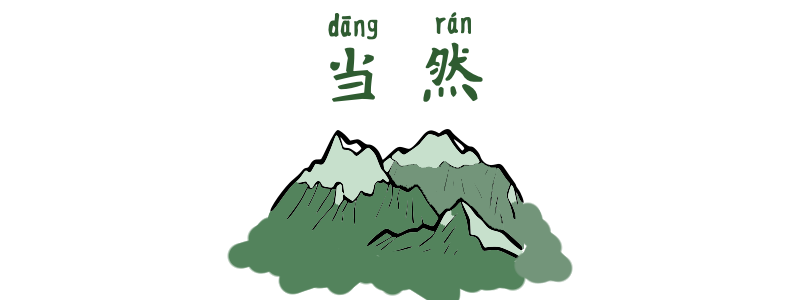Grammar Point:
当然 dāngrán is an adverb that expresses certainty, indicating that something is “certain,” “obvious,” or “of course.
Structure
S + 當然/当然 dāngrán + Predicate
恐怖片當然還是要在電影院看才好恐怖片当然还是要在电影院看才好
Of course, horror movies are best enjoyed in the cinema.
鹹酥雞當然要加九層塔才好吃咸酥鸡当然要加九层塔才好吃
For crispy chicken, adding basil is a must to make it delicious.
你昨晚那麼晚睡,今天當然會打瞌睡你昨晚那么晚睡,今天当然会打瞌睡
Considering you slept so late last night, naturally, you’d be sleepy today.
你喝這麼多咖啡,當然會跑廁所你喝这么多咖啡,当然会跑厕所
You’re consuming so much coffee, naturally, you’ll need to use the restroom.
你戴著耳機,當然聽不到你戴着耳机,当然听不到
With headphones on, of course, you can’t hear.
你去台灣了,當然應該去阿里山看看你去台湾了,当然应该去阿里山看看
Since you’re in Taiwan, of course, you should visit Alishan.
FYI
Alishan is an amazing place in Taiwan! Nestled right in the heart of the island, it’s all about misty forests, ancient trees, and these mind-blowing sunrise views. You won’t believe the trees – some of them have been around for like a thousand years. And it’s not just nature, you know? The Tsou culture there is like this beautiful mix of old traditions and modern life. Oh, and there’s this Alishan Forest Railway – a historic train that’s like a journey through time. Seriously, if you’re into hiking, stunning views, and a touch of culture, Alishan’s the place to be.


當然/当然 dāngrán + Short Phrase
A:我可以看一下這本書嗎?我可以看一下这本书吗?
Can I take a look at this book?
B:當然可以当然可以
Of course you can.
A:晚上要一起吃飯嗎?晚上要一起吃饭吗?
Do you want to have dinner together tonight?
B:當然好当然好
Of course!
A:你可以借我你的牙刷嗎?你可以借我你的牙刷吗?
Can you lend me your toothbrush?
B:當然不行!你有病啊!当然不行!你有病啊!
Absolutely not! What’s wrong with you?
A:老師給那麼多作業,你全部做完了嗎?老师给那么多作业,你全部做完了吗?
The teacher assigned so much homework, did you finish all of it?
B:當然做不完,我已經放棄了!当然做不完,我已经放弃了!
Of course not, I’ve already given up!
Other Common Phrases
理所當然/理所当然 lǐsuǒ dāngrán
理所当然 lǐsuǒ dāngrán can be translated to English as “taken for granted” or “as a matter of course. It’s used to describe a situation or something that is expected or accepted without question because it’s considered to be the natural or logical outcome. It implies that there’s no need for further explanation or justification because it’s widely acknowledged or understood.
父母愛孩子不是理所當然的嗎?父母爱孩子不是理所当然的吗?
Isn’t it natural for parents to love their children?
你驚訝什麼?養狗的人每天帶狗散步是理所當然的你惊讶什么?养狗的人每天带狗散步是理所当然的
What are you surprised about? People who have dogs naturally take them for a walk every day.
你不該理所當然地認為他得幫你你不该理所当然地认为他得帮你
You shouldn’t just assume that he has to help you without question.
Practice
TouchHover over the space to see the answers.
✔️ Drinking so much, of course, you’ll get drunk.
你喝這麼多,當然會醉你喝这么多,当然会醉
✔️ When a typhoon comes, of course, flights need to be canceled.
颱風來了,當然得取消航班台风来了,当然得取消航班
✔️ Tiffany is, of course, a good teacher, you don’t need to worry. 😎
Tiffany 當然是一位好老師,你不用擔心当然是一位好老师,你不用担心


